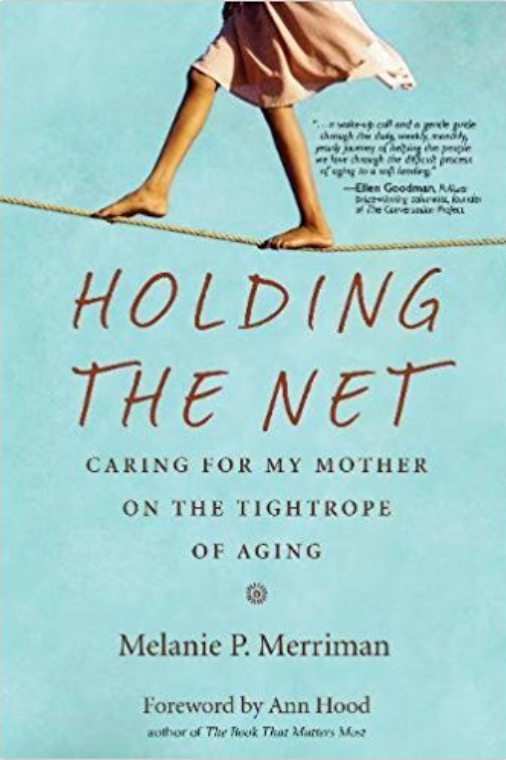Show Notes Episode 150: In Transition: How to Write a Story About an Ongoing Situation
/Today on our show, we’re talking about how to write about a situation that is ongoing. Typically, at the end of an essay, the narrator writes about what they learned or how they changed. But what if transition IS the change? What happens if there is no happy (or sad) ending…yet?
On this episode, Ariane Malfait writes about her transition–-one that is still in progress and may always be. Ariane tells the story of shedding the masculine body she felt never fit. At 19, after bottom surgery, she expects to finally feel like herself, but when she wakes up from surgery, she is plunged into darkness. Her story is called The Creation of Flesh.
Ariane Malfait is a Belgian journalism student with a passion for writing. She writes mainly nonfiction and poetry but loves to experiment with other genres. You can find Ariane on Instagram and Medium.
Writing Class Radio is hosted by Allison Langer and Andrea Askowitz. Audio production by Matt Cundill, Evan Surminski and Aiden Glassey at the Sound Off Media Company. Theme music is by Emia.
There’s more writing class on our website, including stories we study, editing resources, video classes, writing retreats, and live online classes.
For $35/month you can join our First Draft weekly writers groups. You have the option to join Allison on Tuesdays 12-1 ET and/or Zorina Frey Wednesdays 7-8pm ET. You’ll write to a prompt and share what you wrote. If you’re looking to take your writing to the next level, check out all the classes we offer on our website, writingclassradio.com.
Join the community that comes together for instruction, an excuse to write, and most importantly, the support from other writers. To learn more, go to www.Patreon.com/writingclassradio. Or sign up HERE for First Draft for a FREE Zoom link.
A new episode will drop every other WEDNESDAY.
There’s no better way to understand ourselves and each other, than by writing and sharing our stories. Everyone has a story. What’s yours?
If you would like a transcript of the episode read below:
Andrea Askowitz. 00:00:00
A hundred and 50 episodes.
Alison Langer 00:00:01
Yeah. That's fucking cool.
Andrea Askowitz. 00:00:03
Nice round number. That's very cool.
Alison Langer 00:00:04
I can't believe we've been doing this for 150 episodes. Like, seriously.
Andrea Askowitz. 00:00:09
I know. It only took us 150 episodes to get any good.
Alison Langer 00:00:12
Well, that's still up to our listeners, I guess.
Andrea Askowitz. 00:00:16
I feel like we finally got it. I'm Andrea Askowitz.
Alison Langer 00:00:26
I'm Alison Langer, and this is writing class radio. You'll hear true personal stories and learn how to write your own stories. Together, we produce this podcast which is equal parts heart and art. By heart, we mean the truth in a story. By art, we mean the craft of writing. No matter what's going on in our lives, Writing Class is where we tell the truth. It's where we work out our shit. There's no place there's no place in the world like Writing Class. And we want to bring you in.
Andrea Askowitz. 00:00:55
Today on our show, we're talking about transitions. What's really interesting about the story you're about to hear is that we realized that it doesn't really have a solid no, it has a solid ending, but it's not like an A to B kind of ending. And it made us both think, like, maybe we're all just transitioning all the time. So the story is really honest that way. Today on our show, we bring you a story by Ariane Malfait. Ariane is a Belgian journalism student with a passion for writing. You guys, she's all the way in Belgium. I love it.
Alison Langer 00:01:36
I love when you think, like, somebody in Belgium is so far away. We live in the United States and think that the whole world revolves around us. I mean, we're so stupid.
Andrea Askowitz. 00:01:47
She is, like, 6 hours ahead of us. That's cool.
Alison Langer 00:01:51
But how did we get her? I think it was Terry Barr who recommended her. Or that she send her story in to us.
Andrea Askowitz. 00:01:59
Right? And and Terry Barr was the star of episode 146. So thank you, Terry Barr, for recommending Ariane to our show. Ariane writes mainly non fiction and poetry, but loves to experiment with other genres as well. So now she's experimenting with essay. Damn. We'll be back with Ariane story after the break. We're back.
Alison Langer 00:02:25
I'm Alison Langer, and this is writing class radio. Up next is Ariane Malfait reading her story, the Creation of Flesh.
Ariane Malfait 00:02:39
Seven years ago, the doctors cut open my body and sculptured a vagina between my legs. I'm newly 19 when they roll me through the long hallway on squealing wheels. I'm holding my gaze to the ceiling where fluorescent lamps pass me one every few meters, accelerating my nerves. I lean onto the stiff white pillow behind me and 80 minutes away by staring at the clock; 09:15 a.m. I tell myself not to cry, but feel my eyes fill up with tears anyway. I'm nervous. I've never been really sick, never spent one night at the hospital, never broken any other 206 bones that hang my body on its rack. A group of doctors and nurses appear. I recognize the lost burst and to approach the bed. Professor Monstre, the famous plastic surgeon I've had multiple appointments with over the last four years. His name, almost pronounced as monster, always felt ironic to me. He's drawing lines and crosses all over my body, deciding where to cut, where to take and where to build. Without even noticing the tears on my cheeks. The doctors leave and I'm alone again, my tears mixing with the black markings across my chest. What was I supposed to do with the body I didn't want? I felt like this from the moment I was born. A girl trapped in a male body. I've evolved into this, and just like every other living thing, I followed Darwin's survival of the fittest. I adapted to my surroundings in order to stay alive. The other option would have been simply not existing at all. A few minutes later, I'm rolled into the operating room. When you were a child, did you ever play the game "I see, I see what you can't see" to pass the time over long car rides? I did. Well I see I see what you can see. I see a scared woman in a boy's body lying on a single bed in the bright lights, hoping this surgery makes her feel whole. I see shimmering metal tools laying on a table needed to remove contradictionary parts. I see the anesthesiologist preparing to put me to sleep for 8 hours. I look into her eyes. I listen to her soothing voice. She asks me questions, but I can't really hear them. I breathe in the gas like I'm told and count backwards. Ten, nine eight, white, seven, black, six. The first thing I remember after the surgery is my parents smiling down on me. My mom has her cool hand on my glowing forehead. My father is standing at the end of the bed, taking its usual distance. The days after are a blur. But on the 6th day in the healing process, I'm able to take my first step towards the bathroom, towards the wall sized mirror. My eyes are sunken, my ribs are protruding, my legs are trembling. Pale white skin is laced with black thread, holding pieces of blue, purple, swollen flesh together. There's blood, almost black, flaking around new body parts. And down there everything is flat. Everything is gone. What have I done? The depression I faced as a teenager dealing with this gender dysphoria seemed fixable once I got the operation. There was an end date to the suffering; I would feel whole. Now seeing myself all broken and put back together, I realize the suffering isn't over. I stare into the hospital mirror again and as my fingers discover the newness of what I see, I'm shaking. My skin feels foreign, my breasts feel hard. I'm reminded of a Willem Lembrook statue I once saw in the MoMA in New York City. There I held my palm on the naked marble girls breasts like many before me had done. Noticeable from the discolored area around her chest. She was called the kneeling woman. I fell to my knees too. The darkness that overcomes me postsurgery is darker than it had ever been before. People around me were puzzled. Isn't this what you wanted all along? They admired a creation like puzzle pieces put together to create an image of a woman. But in every puzzle, if you look closely, you'll see the areas where the pieces meet black cracks, fragments of the real thing. I'm a woman put together the pieces stitched with a black thread. And although I look like a woman, I feel bitter to the core. I'm not the Taboola Rasa, the blank sheet I thought I'd become. No new girl reborn. I'm still me. My body only modified, reshaped and yes, perhaps improved. It's still my mind, confused by what it did to get here. And so, in the aftermath of my transformation, I questioned all I was and all I had become. Why did I do this? If I will never truly realize how the female mind works, if I will never feel the softness of naturally occurring breasts or the pain of a menstrual cycle, if I will never feel life growing inside my belly. Even Professor Monstrey, who praised me as one of his finest creations, dismissed my dilemma, using words as petite and delicate, and then assured me of who I was and who I am. "Look at you. You're so feminine. Your features don't show any sign of the other sex. How can someone so beautiful have these issues?" "Thank you, Doctor". It's all I owe him. Now I'm a 25 year old human and a 70 year old woman. Although on some days it feels like I'm living inside something that's not my own, I've slowly learned to accept this body. It started with being able to express myself in looks and clothing. Sexuality was also a big factor. Being able to experience sex as a female opened up a whole new world for me. I felt sexy, passionate, admired and loved. And finally, I'm starting to see the transformation my body underwent as an extension of myself.
Andrea Askowitz. 00:09:05
I am blown away by this story.
Alison Langer 00:09:08
Yeah.
Andrea Askowitz. 00:09:08
And her reading of it. It's so emotional and so vulnerable.
Alison Langer 00:09:17
I know, I agree. I feel the same way. It was very heartfelt, is what was really cool. It's like I felt like I was waking up in the room with her. I felt like I was transitioning along with her. Which was really cool.
Andrea Askowitz. 00:09:31
I know. And the story took turns that I wasn't expecting. I did not expect her to look in the mirror and feel worse, to feel the darkness that she described. Did you?
Alison Langer 00:09:48
No, I did not.
Andrea Askowitz. 00:09:50
I feel very thankful that she wrote the story and is trusting us with it.
Alison Langer 00:09:56
Let's talk about some of the things that she did really well.
Andrea Askowitz. 00:10:00
Right from the beginning, I felt her fear. She describes how she'd never been in the hospital before and I remember talking to you about this, and you wanted to know why she was afraid. And I was like, no, she's afraid because she's about to go into surgery. For me, it was exactly all I needed. She was just, like, describing, like, looking at the ceiling and -
Alison Langer 00:10:28
Back up a second. Back up a second to the very first line. Seven years ago, the doctors cut open my body and sculpted a vagina between my legs. So she grounds us right away. She's not trying to spring it on us later. We get all the information right at top, so we know what we're looking at, we know what we're going through, and now we're going to go on a journey with somebody.
Andrea Askowitz. 00:10:48
That's true. And that's a very, very, very strong first line. The doctor cut my body open and sculpted a vagina between my legs. That's a lot.
Alison Langer 00:10:58
Yeah, but I loved it.
Andrea Askowitz. 00:11:00
And then she tells us she was 19. Yeah.
Alison Langer 00:11:02
So we get a little backstory. We always love to talk about the structure. I think people are struggling with that. How do I tell this story? It's a creation story. It's not just name the Creation Of Flesh. It is a creation of story. It's a transition, but also a creation. And a lot of people havenlike reckonings or rebirths or awakenings of some sort, and it could be after cancer, after divorce, after anything. And this is an excellent structure for anybody who's writing that story.
Andrea Askowitz. 00:11:33
That makes me think of the more specific, the more universal, because while most of our listeners haven't gone through this experience, most of our listeners have gone through some kind of transition and have emerged. That's so cool. Okay, so she tells us exactly what she did seven years ago, and then she tells us she was 19 and then we're at that point that drew me in perfectly because I felt her anxiety. I felt scared for her going into surgery and she's going into, like, such a big surgery. I guess every surgery is big, but.
Alison Langer 00:12:14
This is not no, every surgery, yes. Although big because you're going under whatever it is, and you're hoping that whatever it is, if it's a tumor, it's going to be gone. If it's eye surgery, you hope you look better, all those kind of things. But this person is going to wake up different, like a whole other person. I think that's just amazing. That's trust to put into somebody. That's a huge decision.
Andrea Askowitz. 00:12:38
All right, so her surgery is bigger than other surgeries. So she's about to go into this enormous surgery, and then she tells us why. What was I supposed to do with the body I didn't want?
Alison Langer 00:12:50
God, I know, I know.
Andrea Askowitz. 00:12:52
And then she kind of even raises the stakes more right there. She says what she did was she adapted because her only other choice was not to exist at all. I was like, I got chills. She really convinced me that she really felt like she had no choice.
Alison Langer 00:13:12
This is where this narrator could have gone off on a tangent and gone in a totally different direction. But this is what the narrator has to decide when they're writing an essay, a short 1100 or 1200 word essay. Like, okay, now am I going to go and tell how I felt and what it growing up until this point and go off and sidetrack us, even though it's really pertinent and informative information. But she just makes the decision to say, this is how I felt, and keeps moving forward with the surgery because that is what we're writing about here.
Andrea Askowitz. 00:13:47
True, she could have talked about how she adapted, but she didn't. She just said she did and that was enough. That was totally enough. Then she's counting backwards. Why did she say, ten, nine, eight, seven, white, black, six?
Alison Langer 00:14:03
Because I think it's when you're there, that's what you see, like, as you're going under, you see like, first it's like bright, nothing else. You can't because I mean, I remember this when I was going under many surgeries is that they're telling you to count backward and then everything fades and all you see is like a white light, that kind of thing and then it just goes black.
Andrea Askowitz. 00:14:23
Yeah. It was very visual and I felt it. I just wondered if there was more significance that I wasn't getting. Maybe, maybe not.
Alison Langer 00:14:30
I don't think so.
Andrea Askowitz. 00:14:31
Okay. Then she wakes up from surgery. We get a sense of her parents. They're supportive. Her dad is distant, but I felt like he was there for her. But then this part really drew me in. When she's looking at the wall size mirror, I just was so anxious to hear what she was going to see. And then she tells us it's like the blood that was almost black. Everything is flat, gone. And then she's like, "What have I done?" And I feel the despair that she feels like she thought the suffering was going to be over, but the suffering isn't over. She did such a great job talking about the statue that was on its knees, like the hard breasted statue. And then she's like, I fell on my knees too. God, that was so good. And I was just feeling like this sad, sad statue, was darker than she'd ever felt before. "Bitter to the core. No new girl reborn."
Alison Langer 00:15:35
It brought me to a place, though, where I think sometimes with our brains, we think everything is going to be better, if only. But sometimes it just takes our mind a chance to adjust and adapt and get into that new what they say, new normal, that overused term. But it is true. There's a lot of pain sometimes that comes with leaving that person, that thing, whatever it is, behind us as we move forward. I think it's a natural process, and we see this process with her in real time, which I thought was super cool.
Andrea Askowitz. 00:16:10
So there's another example of, like, you might not have had this exact experience, but you may have had an experience where you moved to another town. You're like, if only I was living where I really wanted to live, or if only I had a boyfriend, or if only. And then the reality is not what you thought. But in this case, it was so much bigger. It's so big. It was everything she's always wanted since she was a tiny kid. And now she's like, what? I'm not a new girl reborn. I'm still me. It's still my own mind. This is shit.
Alison Langer 00:16:43
Yeah.
Andrea Askowitz. 00:16:44
And what about Monstree, the doctor? Very cool.
Alison Langer 00:16:47
Yeah, I really loved that because for him, it was a job and he was proud, like an artist. He did his job, everything. But there's no emotion in a doctor. Well, not all doctors, but especially here. Yeah, I don't know if he was emotional. We didn't get that. I'm getting that there was nothing emotional. And he's like, I gave you what you wanted. What's your problem?
Andrea Askowitz. 00:17:09
Yeah, look at how feminine you look. I built you just so.
Alison Langer 00:17:16
Yeah, but isn't that true about all of us? Like, here we are going out into the world with our exterior, but there's the unfortunate interior in the mind and everything in the heart. He built her beautiful facade, but she still has to get used to it and learn how to be happy like all of us.
Andrea Askowitz. 00:17:32
Yes. And then this line I loved. Now I'm a 25 year old human and a seven year old woman. So she told us at the very beginning that this happened seven years ago, and now she's been a woman for seven years. She's a seven year old woman. That's so well said. And then I thought the ending was really interesting. Your favorite thing is to talk about how hard endings are. And this ending again, I don't think it was what I would have expected. She's not like, oh, and now I'm cool with my woman's body. Instead, she's like, well, now this transition, transitioning. I don't know if she calls herself trans. No, but that's so interesting because what she lands on is she's starting to see the transformation of her body as who she is. Being in transition is her new normal. And who knows how long that's going to last? Maybe that's the rest of her life. And that's kind of really honest.
Alison Langer 00:18:40
Because it's interesting because after I read it, I was like, well, what did you do? How did you become? How did you get to this point? But there wasn't a real answer to that.
Andrea Askowitz. 00:18:48
You mean when you guys were editing?
Alison Langer 00:18:51
Yeah, and you and I even talked about this too. I was like, do you think we should see if we can press on a little bit more, like, I want to know, because we all want the map, the blueprint, how do we get from point A to point B? Where is it?
Andrea Askowitz. 00:19:02
Right?
Alison Langer 00:19:02
But the reality is there isn't one.
Andrea Askowitz. 00:19:05
Right. We're not quite yet at point B.
Alison Langer 00:19:07
I don't even know if we're ever going to get to point B. Are we ever going to get to point A to point B? We're all trying to make our way towards this ideal place that we think we should get to. And there's really no map. The how- tos only get you through to tomorrow, or like, to the point where this person is. But maybe you're not even at the end yet.
Andrea Askowitz. 00:19:25
Right. No one's at the end yet.
Alison Langer 00:19:27
No, no one's at the end yet. But specifically in this story, she says, I'm learning to live inside something that's not my own. I'm learning to accept this body. I'm starting to be able to express myself in looks and clothing, sexuality is a factor, all that kind of stuff. That's what she does on a daily basis. And I feel like all of us do that on a daily basis. We're learning to be the people we want to be. So that's why I just loved it. It's so specific, but it is 100% universal because we are all in transformation or transition.
Andrea Askowitz. 00:20:00
Yeah. Damn.
Alison Langer 00:20:02
Do you feel like there's something that you're always in transition with?
Andrea Askowitz. 00:20:06
Yeah. Getting famous.
Alison Langer 00:20:08
Okay. Yeah.
Andrea Askowitz. 00:20:08
That wasn't hard. I thought of it immediately, like, I'm always just on the verge.
Alison Langer 00:20:15
But no matter how much you get published, you still don't think you've come yet. Like you haven't arrived. Is it the book? And then you get one another one published. You got one published, tons of essays, you're all over the place. Washington Post, New York Times, like you're in.
Andrea Askowitz. 00:20:28
Go on.
Alison Langer 00:20:29
Yeah. Huffington Post, like you're in every place you want to be, but you just want this last book, this book that you've been farming out, trying to get published forever. Well, I don't want to say forever because it hasn't been forever, it's only been seven years. Anybody else would look at you and be like, well, she got a book published, she has all this stuff, and yet you're not where you want to be.
Andrea Askowitz. 00:20:53
I mean, maybe like Ariane, at some point I'll get to a point where I'm accepting. The problem for me, and I feel like my issue is so minor compared to Ariane's, but am I always going to be that woman wearing a sandwich board? Probably. And at some point, I'm just going to have to be okay with it. I am okay with it. I think that's going to be the cover of my book, "Attention Whore". You're going to see a picture of me and I'm going to be wearing a sandwich board, and that's going to be the cover and then maybe it's going to be like a scene of New York City and all these people rushing by and no one's paying attention to me. And then on the back, you'll see me in the sandwich board and I'm like, desert. And no one's there. I'm just standing alone in a desert with my sandwich board like buy my book.
Alison Langer 00:21:45
But I feel like all authors are like that. Unless you're like James Patterson or Stephen King or something like that. But I feel like everybody is hustling.
Andrea Askowitz. 00:21:53
True, but not everyone has this feeling, I don't think, or maybe a lot of people do, of not quite having arrived. So what's yours? Where are you in transition?
Alison Langer 00:22:05
Money the same shit. I feel like I have enough to survive. I'm doing just fine. I can make money, everything's going well, I'm doing exactly what I want to do. But it's just when I plan a trip, I have to count my pennies. When I buy something. Do I really need this? I want to just be able to be like, yeah, here. I want to be generous. I want to be able to throw it around. I want to feel like I've made it.
Andrea Askowitz. 00:22:30
So I'm going to ask you the same question. If you won the lottery, would you feel like you had enough?
Alison Langer 00:22:35
No, because then I want to get published. I want all my books. Like, I want everything out there and then I want that.
Andrea Askowitz. 00:22:41
No, in terms of money, like, let's say that you stepped on a bag full of cash in the park and it was like a million dollars. Would that be enough? Or would you be like, no, because now I want to buy this and this and this and this.
Alison Langer 00:22:55
No, that would be enough. I don't care about I mean, I would buy a new car because I would like some bluetooth in my car and it's 17 years old and it's not even mine, but you know what I'm saying? I wouldn't mind being able to just buy stuff and not worry about it. But before I had kids, I did feel very happy financially. I just wasn't spending that much. I'm not that person.
Andrea Askowitz. 00:23:16
Well, then your example is different because you're saying you would feel like you arrived.
Alison Langer 00:23:22
I'd find something new because that's who we are, always. So yeah, I guess in this general example, you reach a point, but mentally, I don't know, because I'm not there. Maybe I wouldn't feel that way, but I think I would. But once you got your book published, would that be enough?
Andrea Askowitz. 00:23:37
No, I'm pretty sure no, I'm pretty sure I'll never feel like I've arrived.
Alison Langer 00:23:43
Do you think that's good? Maybe it's good and maybe it's a challenge. Maybe it's what keeps us moving forward and excited.
Andrea Askowitz. 00:23:50
Right.
Alison Langer 00:23:52
They enjoy the process.
Andrea Askowitz. 00:23:53
Exactly.
Alison Langer 00:23:54
That's what we've come to. And I think that's where Ariane is, too, that she's, like, starting to see the transition. And I get the feeling happy with where she's moving in that general direction.
Andrea Askowitz. 00:24:06
She's become comfortable with the transition.
Alison Langer 00:24:09
Yeah.
Andrea Askowitz. 00:24:17
Thank you, Ariane Malfait, for your beautiful story in making us think. Oh, and thank you for listening, I forgot that part. For links to Ariane's work. What do we have? Do we have her website?
Alison Langer 00:24:32
She has a Medium account and an Instagram account.
Andrea Askowitz. 00:24:35
So we'll have her Medium account and an Instagram account in our show notes. Writing class Radio is hosted by me, Andrea Askowitz.
Alison Langer 00:24:43
And me, Alison Langer.
Andrea Askowitz. 00:24:45
Audio production by Matt Cundill, Evan
Alison Langer 00:25:37
Yeah.
Andrea Askowitz. 00:25:38
To learn more, go to patreon.com/writingclassradio. A new episode will drop every other Wednesday, and they've been dropping every other Wednesday for 150 episodes.
Alison Langer 00:25:53
I know we're good. All right, there's no better way to understand ourselves and each other than by writing and sharing our stories. Everyone, everyone, and I mean everyone, has a story. What's yours? Produced and distributed by the SoundOff Media Company.














